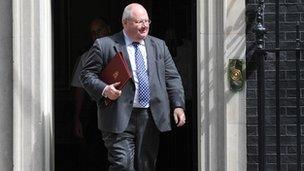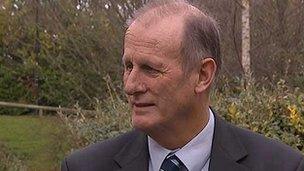Council tax freeze splits Tories
- Published
- comments

The government's drive for a council tax freeze has brought tensions with council leaders to the surface
Tory council leaders have long been privately voicing their exasperation - and that's putting it politely - with Local Government Secretary Eric Pickles, external and his handy hints and tips as to how they should be doing their jobs.
This centres on what they would see as - and again I err on the side of politeness - his overly optimistic view of their ability to maintain essential public services in the face of dwindling finances.
The government's drive for a country-wide council tax freeze next year has brought these tensions to the surface.
Mr Pickles is offering councils a one-off payment - equivalent to a 2.5% rise in their council tax - if they agree to a freeze for the coming financial year.
Ministers, of course, have no power to enforce a freeze.
Indeed there are few things they like talking about more than all the decision-making powers they are returning to local communities.
Balancing act
At the same time Mr Pickles - and his lieutenant Local Government Minister Bob Neill, external - are making it quite clear that in their opinion councils have a "moral duty" to take the money and freeze the tax.
Not to do so, they say, would be a "kick in the teeth for council taxpayers" and to "treat the local electorate with contempt".
So it's not a great time to be leading a Conservative council which takes the view that it can't balance the books without putting up council tax.

South Hams District Council leader John Tucker is one of many council chiefs facing new challenges
Most Tory councils are toeing the line. But authorities like Surrey County Council, external and South Hams District Council, external in Devon are kicking back.
Surrey is implementing a 2.99% increase. So councillors there clearly don't feel the government's 2.5 will even cover this year - let alone the longer term.
South Hams is putting council tax up by just 2.5%.
On the face of it, this is more puzzling: wouldn't it be cleverer to accept the government's generous offer, give your electors a little council tax holiday and then put up council tax the following year if you really felt you had to?
It's not that simple, though, for councils like South Hams or Surrey.
They clearly see council tax as something which - like hot air - has an inexorable tendency to rise.
Accordingly, their financial planning is obviously based on at least a vague presumption of cumulative increases in the years to come.
South Hams' 2.5% increase will roll over automatically into the council's base funding in the following year and the years after that.
Taking Uncle Eric's short term shilling would have thrown things into disarray because the money simply wouldn't be there to roll over into the next year.
Local referendum
A council could, in theory, simply whack up the council tax the following year to fill the hole. This, though, would present a major headache in practice.
Maintaining the funding level provided by the expired government grant would mean a 2.5% council tax rise just for starters.
Throw in the additional rise calculated for that year itself (let's say another 2.5% or so for the sake of argument) and the council would be in real trouble.
Demanding an increase of 5% or more from taxpayers at one fell swoop would have run the risk of capping under Labour.
Now, councils face an even more formidable obstacle: any increase above 3.5% would have to be subject to a local referendum.
And the government has made it clear that threshold could change in future.
'Ludicrous argument'
So councils are undoubtedly right to say freezing tax this year could seriously upset their financial planning for years to come.
Eric Pickles reportedly told the Local Government Association's finance conference, external that refusing the freeze money because it would not be part of the base funding in future years was a "ludicrous argument".
Not because the proposition is untrue, but because the "whole idea" of the freeze is to get councils' financial bases down.
That would seem to leave those Tory councils with their hearts set on year on year tax increases in direct ideological conflict with their colleagues at Westminster.
That's one of the points I put to South Hams District Council, external leader John Tucker this week in the film below.
We also touched on a general feature of the government's much-trumpeted localism agenda.
On the one hand, ministers going out of their way to bang on about local authorities having the freedom to make the judgements they see fit.
But, on the other, making it emphatically clear what they think those decisions should be and publicly excoriating those councils who dare to use their freedom to disagree.